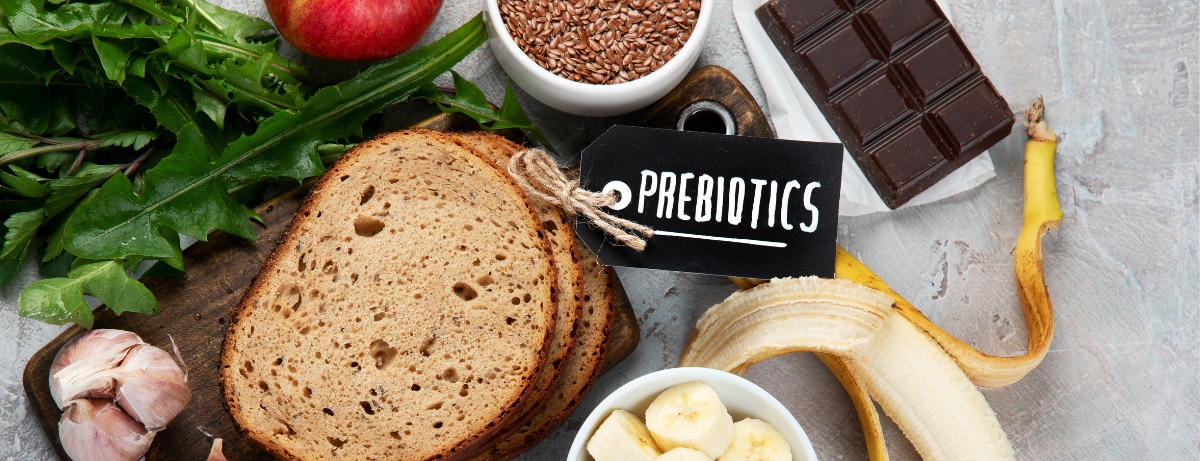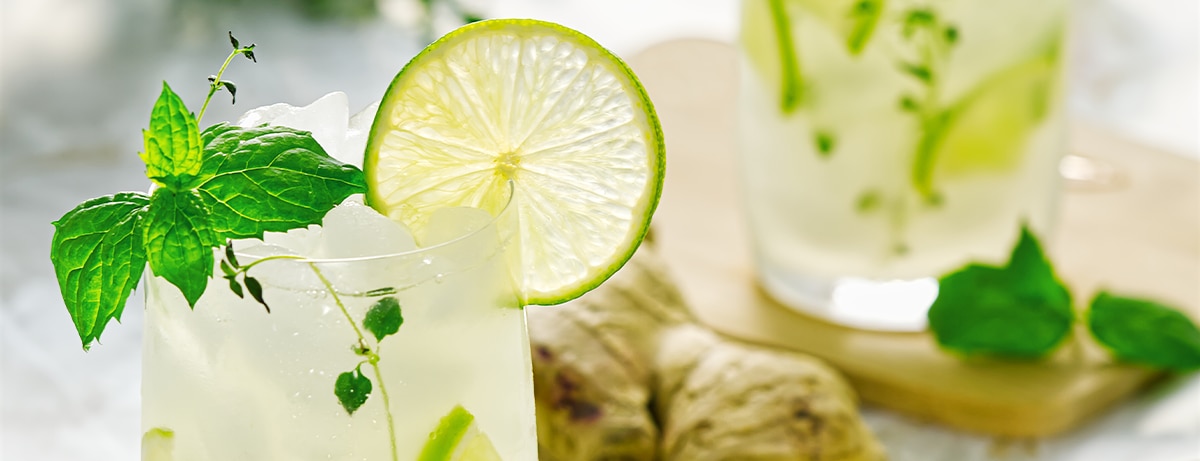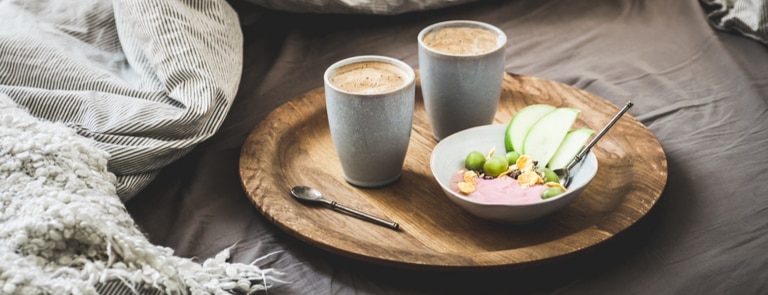15% off €25
Code:BASKET
What to eat with stomach flu

We look into the best foods to eat when suffering with stomach flu, plus foods that you should avoid! We also give other tips for managing with stomach flu
Summary
1How to avoid getting stomach flu
You cannot always avoid getting gastroenteritis, but there are steps you can take to minimise your risk of getting it, and of spreading it on...
2The best drinks to have with a stomach bug
The main complication from stomach flu is dehydration, resulting from extreme loss of liquids and essential salts and minerals. Try stick to water...
3The best food to have with a stomach bug
Soups are great, thanks to their liquid content. The warmth can be soothing and the cooked food a little easier to digest. Plain rice, pasta, and...
The stomach flu, also called gastroenteritis, is actually an infection of the intestines.
And, as anyone who has suffered from it will know, the most obvious sign of the infection is ongoing watery diarrhoea.1
If you have got stomach flu, you have probably been in contact with someone else who had it, or else you have ingested contaminated food or water.
Assuming that your general state of health is okay and your immune system is in good shape, you should recover from stomach flu on your own.
There is no effective treatment for gastroenteritis, but there are things you can do to make the experience more tolerable and perhaps more importantly, to avoid exacerbating it.2
Stomach flu symptoms
The main symptoms of gastroenteritis are the above-mentioned watery diarrhoea (which typically arrives very suddenly), feeling sick, vomiting, and a mild fever.
You may also experience a loss of appetite, headaches, aching limbs, and an upset stomach.
Usually, the symptoms last less than a week.3
Unfortunately, the symptoms are fairly similar to viral diarrhoea, caused by bacteria such as salmonella and giardia.4
Foods to avoid if you have gastric flu
Initially, when the stomach flu first hits, you may want to stop eating solid foods for a few hours.
When you can, you can start by taking small sips of water or sucking on ice chips. Then, gradually get back into eating.
Fizzy drinks and fruit juice can make your diarrhoea worse, so they should be avoided.
Babies with stomach flu can breastfeed as usual, or consume other milk feeds.5
It is also important to avoid caffeine, alcohol, smoking, fatty foods, strongly seasoned foods, and dairy products until you feel better.6
Caffeine, for example, contracts your intestines and can make the diarrhoea worse, whilst alcohol acts as a diuretic and can further aggravate your stomach.
Acidic and tomato-based dishes are also best avoided.7
The best drinks to have with a stomach bug
The main complication from stomach flu is dehydration, resulting from the extreme loss of liquids and essential salts and minerals.
However, if you drink enough to replace the lost fluids, you should not have any problems.8
If you can, stick to water or teas.
Some caffeine-free teas can also help ease any nausea. Peppermint tea is particularly good for calming the stomach and intestines, and ginger is great for reducing the feelings of nausea.
You can have them together, if you prefer. Cinnamon and turmeric are two spices that you could consume (unlike pepper and chilli). They are reported to help relieve gastroenteritis.
And yoghurt, once you can cope with dairy products, is great with combatting watery diarrhoea and helping restore the gut balance in your digestive system.9
You can also use rehydration drinks, made from sachets of powder that you can get from pharmacies and some supermarkets, if you have signs of dehydration such as a dry mouth or urine that is darker in colour than usual.10
The best food to have with a stomach bug
As for food, keep it plain, boring and simple.
Soups are great, thanks to their liquid content. The warmth can be soothing and the cooked food a little easier to digest.
Plain rice, pasta, and bread are also good options.11
You can also eat some wholesome baked potatoes and a lean meat such as fish – just keep the spices to a minimum.12
Other easy-to-digest foods that you can eat include soda crackers, gelatin (i.e. jelly), bananas, and chicken.
If you get nauseous, stop eating solid food until it passes.13
Other tips for dealing with stomach flu
Because gastroenteritis spreads so easily and does not have a direct cure (though you can take medication for the headaches, fever, or the diarrhoea if it lasts longer than 24 hours), it is best to stay at home and let your immune system do its job.
Some medications such as ibuprofen can make your stomach more upset, so you might want to use them sparingly, if at all.14
However, you may want to see a doctor or get medical advice if the symptoms get worse.
For example, if you get severe dehydration along with symptoms such as dizziness or loss of consciousness, or you have bloody diarrhoea or a fever over 38 degrees Celsius, then you should get further help.15
How to avoid getting stomach flu
You cannot always avoid getting gastroenteritis, but there are steps you can take to minimise your risk of getting it, and of spreading it on.
These include washing your hands frequently with soap and water, particularly while preparing food and after using the toilet.
You can wash potentially-contaminated surfaces (like the kitchen sink or the toilet) with a bleach-based cleaner.
And practice good food hygiene by refrigerating products that need it, and washing or cooking other products thoroughly.16
- https://www.mayoclinic.org/diseases-conditions/viral-gastroenteritis/symptoms-causes/syc-20378847
- https://www.mayoclinic.org/diseases-conditions/viral-gastroenteritis/symptoms-causes/syc-20378847
- https://www.nhsinform.scot/illnesses-and-conditions/stomach-liver-and-gastrointestinal-tract/gastroenteritis
- https://www.mayoclinic.org/diseases-conditions/viral-gastroenteritis/symptoms-causes/syc-20378847
- https://www.nhsinform.scot/illnesses-and-conditions/stomach-liver-and-gastrointestinal-tract/gastroenteritis
- https://www.mayoclinic.org/diseases-conditions/viral-gastroenteritis/diagnosis-treatment/drc-20378852
- https://health.clevelandclinic.org/eat-drink-avoid-stomach-flu/
- https://www.mayoclinic.org/diseases-conditions/viral-gastroenteritis/symptoms-causes/syc-20378847
- https://www.medicinenet.com/stomach_flu_natural_and_home_remedies/article.htm
- https://www.nhsinform.scot/illnesses-and-conditions/stomach-liver-and-gastrointestinal-tract/gastroenteritis
- https://www.nhsinform.scot/illnesses-and-conditions/stomach-liver-and-gastrointestinal-tract/gastroenteritis
- https://health.clevelandclinic.org/eat-drink-avoid-stomach-flu/
- https://www.mayoclinic.org/diseases-conditions/viral-gastroenteritis/diagnosis-treatment/drc-20378852
- https://www.mayoclinic.org/diseases-conditions/viral-gastroenteritis/diagnosis-treatment/drc-20378852
- https://www.nhsinform.scot/illnesses-and-conditions/stomach-liver-and-gastrointestinal-tract/gastroenteritis
- https://www.nhsinform.scot/illnesses-and-conditions/stomach-liver-and-gastrointestinal-tract/gastroenteritis



